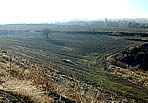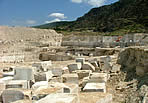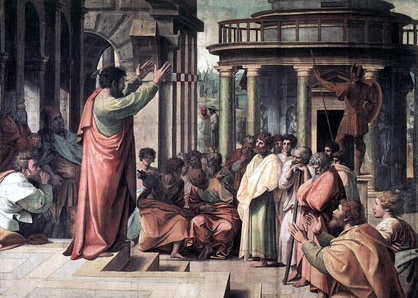Colossae (Honaz) Col. 1:2
Along a main inland road from Ephesus to the Euphrates River,
Colossae shared the beauty of the Lycus Valley with its sister cities: Hierapolis (12 miles
northwest) and Laodicea (12 miles west). The original roads from
Ephesus and Sardis joined there, and this defensible and
well-watered hill became a strategic point in antiquity.
the Lycus Valley with its sister cities: Hierapolis (12 miles
northwest) and Laodicea (12 miles west). The original roads from
Ephesus and Sardis joined there, and this defensible and
well-watered hill became a strategic point in antiquity.
Declining in importance by the time of St. Pauls Epistle to them,
they had already been surpassed in size by the other Lycus Valley
cities. Strabo lists Colossae with smaller villages, not with major cities. The city received an Epistle because of the unique and
insidious errors taking hold there, not because of its size. The
site is abandoned today, near the village of Honaz.
cities. The city received an Epistle because of the unique and
insidious errors taking hold there, not because of its size. The
site is abandoned today, near the village of Honaz.
By the C5BCE, Herodotus noted the large city of Phrygia. The center
of a large and prosperous textile and wool industry, Xenophon
remarked this was a well populated city, large and wealthy. The dark
red wool from the region took the special name colossinium. The attraction of wealth and industry brought together a mix of
Jews, Phrygians, and Greek traders.
The attraction of wealth and industry brought together a mix of
Jews, Phrygians, and Greek traders.
This combination no doubt helps the modern reader of Colossians
account for the variety of philosophies addressed in the corrective
Epistle.
The gospel probably arrived in Colossae with St. Pauls preaching in
Ephesus (cp. Acts 19:10) on the third journey. Perhaps Epaphras, the
Lycus Valleys own evangelist heard St. Paul at Ephesus and returned
with the message. It is impossible to know for sure, but it seems as
though St.
 Paul
had not yet visited at the time of the writing of the Epistle to the
Colossians. Philemon and his slave Onesimus apparently were both
natives of Colossae.
Paul
had not yet visited at the time of the writing of the Epistle to the
Colossians. Philemon and his slave Onesimus apparently were both
natives of Colossae.
The omission of any reference by St. Paul to the great earthquake of
60 CE, causes many scholars to believe St. Paul had not yet heard
the news, or the Epistle predates the quake (Tacitus records the
quake, Annals 14.27). Epaphras visited St. Paul during his house
arrest, and brought news of the Lycus Valley to St. Paul, refreshing
him during the imprisonment.
Biblical Sites in Turkey List


